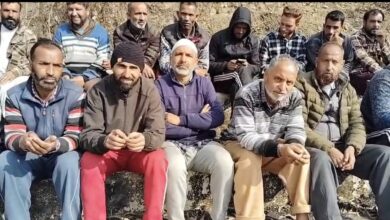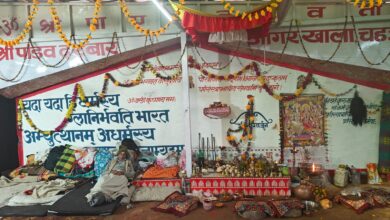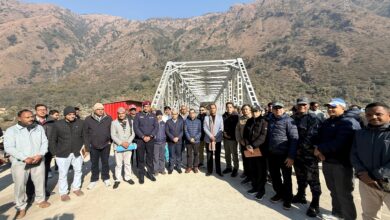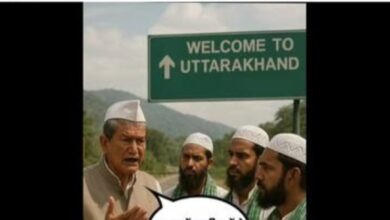Election Commission needs to address the alleged partisan role amidst a faltering image.
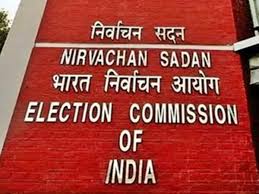
Election Commission needs to address the alleged partisan role amidst a faltering image.
Advocate M. N. Ahamed Sahib
Chennai, Nov 8
Congress leader Rahul Gandhi has exposed massive irregularities in the voter list of Haryana during a recent press conference. Following the earlier revelations from Karnataka, Maharashtra, and Bihar, he has now produced evidence proving that electoral fraud has also occurred in Haryana.
This has triggered nationwide outrage. Tamil Nadu Chief Minister M. K. Stalin has strongly condemned the Election Commission, accusing it of staging a blatant farce within the voter list itself; robbing the people’s democratic verdict. In the midst of this scandal, the Election Commission of India (ECI) has launched a so-called “Special Intensive Revision” (SIR) of the voter list in Tamil Nadu.
The entire nation knows that the Election Commission has been toying with democracy through electoral manipulation. Brazil is globally renowned for football; The photograph of Brazilian model Larissa Bonaci has somehow found its way into the Haryana voters’ list. Perhaps Brazil’s spirit has possessed the Indian Election Commission! Is this how India maintains good relations with Brazil?
Will it stop with Brazil? Or will Argentina, Germany, Italy, and Portugal also be granted voting rights, given that their football teams enjoy huge fan bases in India? That’s the question many are now asking.
If the Election Commission wishes to favour only football fans, then surely cricket enthusiasts deserve their share of justice as well. After all, India has millions of fans of Australia and South Africa’s cricket teams too. Why not add a few of their models to our voter list to make it even more colourful? When Haryana can have 501 voters under a single roof, perhaps the Election Commission might well consider this suggestion too!
Rahul Gandhi’s core allegation is that the 2024 Haryana Assembly election results were stolen through a well-orchestrated conspiracy. Around 2.5 million (25 lakh) fake voters were added to Haryana’s electoral rolls — a staggering 12.5% of its total 20 million (2 crore) voters. Congress narrowly lost eight constituencies by about 22,000 votes each. In total, the party missed forming the government by a mere 1.18 lakh votes. Evidence shows that with the support of the Election Commission, the BJP captured power in Haryana through fraudulent votes.
Rahul Gandhi further revealed that about 3.5 lakh genuine voters, most of them Congress supporters, were removed from the Haryana voter list — and that similar irregularities were underway in Bihar as well. In Bihar, during the enforcement of the Model Code of Conduct, the BJP allegedly deposited ₹10,000 each into the bank accounts of one million women under the Chief Minister’s Employment Scheme — a direct act of bribery using ₹700 crore of taxpayers’ money. The Election Commission, as usual, turned a blind eye.
When the Election Commission Was Trusted?
Once upon a time, the Election Commission of India was an institution of integrity. During the Congress regimes of Rajiv Gandhi, P. V. Narasimha Rao, and Dr. Manmohan Singh, the Commission stood as a pillar of transparency and technological progress. Reforms such as the Photo Electoral Rolls, EPIC voter identity cards, and online voter services modernised Indian democracy.
Under Rajiv Gandhi’s guidance in 1988–89, amendments were made to the Representation of the People Act, 1951 and the Registration of Electors Rules, 1960, giving legal recognition to photo identity cards — a landmark step against bogus voting and impersonation.
In 1993, under Narasimha Rao, the EPIC scheme was formally introduced nationwide to clean up voter rolls. By 1998–99, during the I. K. Gujral and Vajpayee governments, Electronic Voting Machines (EVMs) were tested in select constituencies, promoted as tools for faster results. By 2004, under Vajpayee’s BJP government, EVMs became the sole method of voting nationwide, making India the first country in the world to fully adopt electronic voting. But the Congress treated this as a sign of progress, not realising the fascist potential hidden behind the technology.
In 2009, Dr. Manmohan Singh redefined the Election Commission’s role — declaring that it was not merely to conduct elections, but to build the nation’s democracy. His government launched the SVEEP (Systematic Voters’ Education & Electoral Participation) programme, which significantly raised voter registration and encouraged greater participation by youth and women.
Between 2010 and 2011, during the Congress rule, digital voter lists were published online, allowing citizens to verify their details; a foundation for what later became the National Voter Service Portal (NVSP).
In 2013, again under Congress rule, VVPAT (Verified Voter Paper Audit Trail) was introduced following a Supreme Court order in a case filed by Subramanian Swamy. Trials were held in Nagaland, Mizoram, and Delhi — strengthening transparency in the electronic voting process.
During 2013–14, Dr. Manmohan Singh’s government launched NVSP, an integrated online platform for registration, corrections, and complaints — setting the e-Governance foundation for electoral services.
The Decline After 2014..!!
Since the BJP’s rise to power under Modi in 2014, the Election Commission has steadily lost its credibility. Over the past 11 years, a series of questionable decisions and partisan conduct have deeply eroded public trust. What was once a constitutional, independent institution has been reduced to a political tool.
During the 2019 general elections, numerous complaints were filed against Modi and Amit Shah for violating the Model Code of Conduct. The Commission dismissed all charges and virtually issued them a “clean chit”, treating them like saints. Election Commissioner Ashok Lavasa opposed this but was sidelined and later forced him out to a foreign posting in retribution.
When opposition parties demanded that 50% of VVPAT slips be verified, the Commission refused, allowing checks in only five polling stations per constituency.
In the 2021 assembly elections, EVMs were found in vehicles belonging to BJP officials in Assam, Uttar Pradesh, and Bihar. The Commission brushed it off, claiming those were “reserve machines.”
Transparency vanished in the design and software of EVMs. When citizens sought technical details under the Right to Information Act, the Commission rejected the request, citing “national security” — an excuse that only deepened suspicion.
In 2019, the announcement of elections in Maharashtra and Haryana was deliberately delayed, giving the BJP government extra time to make policy announcements. The Election Commission’s delay, critics argued, tilted the playing field.
During the same period, Yogi Adityanath repeatedly made hate speeches, referring to “Modiji’s army” and targeting Dalits, Muslims, and Christians. Yet the Commission merely issued a “mild warning.”
In 2021, amid the COVID-19 pandemic, the Commission allowed massive political rallies in Tamil Nadu, West Bengal, and Assam — triggering the country’s deadly second wave. Courts even held the Election Commission “responsible for spreading the virus.” When the Commission petitioned the Supreme Court to expunge those remarks, the plea was rejected.
Meanwhile, several IAS and IPS officers critical of the BJP-led central government were transferred, while pro-BJP officers were appointed in opposition-ruled states like West Bengal and Tamil Nadu. Retired Election Commissioners such as Sunil Arora were later rewarded with prestigious posts — an act widely seen as an attack on institutional independence.
Between 2020 and 2023, national media outlets openly criticised the Election Commission’s bias. Former Chief Election Commissioners T. N. Seshan, S. Y. Quraishi, and Ashok Lavasa have all echoed similar concerns. Across Maharashtra, Telangana, Karnataka, Delhi, and Haryana, lakhs of voters have been deleted from rolls — just as 6.5 million were removed in Bihar. With full cooperation from the Election Commission, India has witnessed “One Nation, One Fraud” — an organised, nationwide electoral scam now laid bare.
Tamil Nadu and the S.I.R. Controversy
Amid this climate of distrust, Tamil Nadu too is undergoing the S.I.R. — Special Intensive Revision of its voter list. Despite widespread objections, the process continues in full swing, leaving citizens confused about what documents to submit and how. The DMK and its allies have already filed a case before the Supreme Court challenging the process.
An analysis of the documents demanded under S.I.R. reveals that the BJP-led Union government may be implementing the Citizenship Amendment Act (CAA) indirectly through this exercise. Once the S.I.R. is completed, how many lakhs of Tamils will be struck off the voter list?
And perhaps, when that happens, will Tamil Nadu’s voter list also begin featuring models from other countries — just as Haryana’s did? Only time will tell.
(Advocate M. N. Ahamed Sahib is a National Council Member of Indian Journalists Union (IJU). The views are personal.


